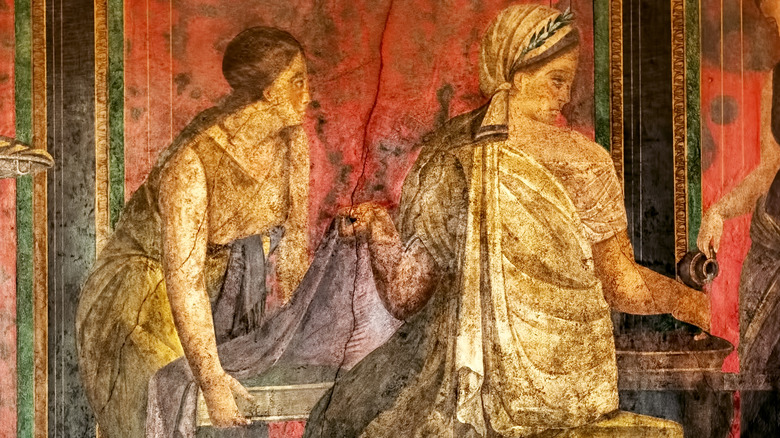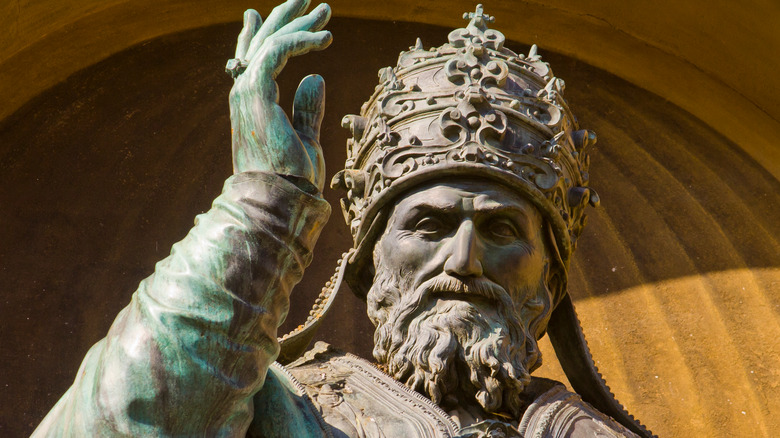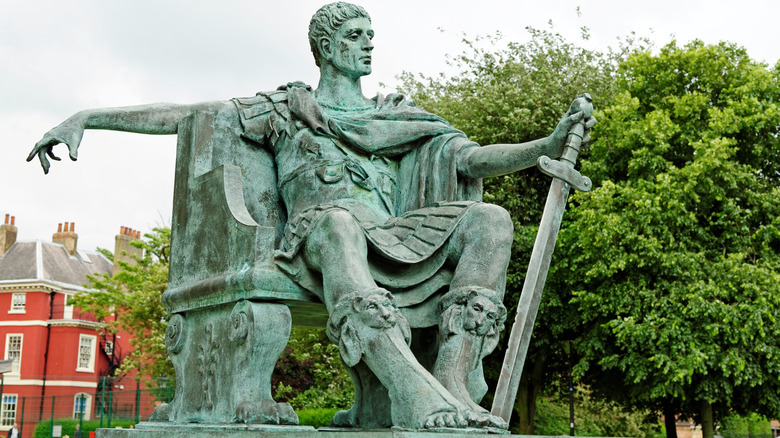The Biggest Theories About The Origins Of April Fools' Day
We all know that April 1 of any given year — also called April Fools' Day, or sometimes just All Fools' Day — is the one day of the year when we should read the news on the internet more carefully, or when we should just keep an extra keen eye on our coworkers before we enter the break room in case we get pranked. Even though April Fools' Day is not an official holiday on par with Christmas or Easter, it's celebrated all over the world, and few people realize that any planned pranks need to be pulled before noon on that day or it's the prankster, instead, who's the fool (via Office Holidays).
But how, when, and where did this most unusual of holiday traditions get started? Turns out, nobody knows for sure. But what is known for certain, April Fools' Day in one form or another does have a long history, beginning in Ancient Rome, if not earlier. There's even an ancient Indian festival that might be where it all got its start. Here are just a few of the biggest theories about the origins of April Fools' Day. In any one of these stories could lie the truth, or instead, the real story of April Fools' Day may yet still be out there to discover — no foolin'.
The ancient Roman festival of Hilaria
One of the most common theories about the origin of April Fools' Day begins in ancient Rome. In those days, the Festival Hilaria, which is Latin for joyful and the root word for hilarious, happened at the end of each March. So no, the Festival of Hilaria is not the world's oldest dad joke. Hilaria, instead, was only observed by followers of the cult of Cybele, the goddess of the wild, healing, fertility, and a protector during times of war. In the festival people dressed up in disguises and pulled pranks on their unsuspecting fellow citizens (via World History). From the sounds of things, Cybele's followers really knew how to party.
Some believe there may even be some precedent for the Festival of Hilaria in ancient Egypt among the followers of Isis, Osiris, and Set, according to History. Although there's no proof that April Fools' Day is definitely linked to the ancient Roman Festival of Hilaria, we do know for sure that the event did take place in the last week of March and concluded on April 1. The true connection between Hilaria and the modern April Fools' Day is otherwise anyone's guess, as the Library of Congress explains.
April Fools' Day in Chaucer
Other possible theories about the origins of this April 1 holiday point us toward Geoffrey Chaucer, the 14th century English writer and poet best known for "The Canterbury Tales," according to Britannica. Regarding this possible theory, the Library of Congress explains that in Chaucer's "Nun's Priest's Tale," written around 1390, there's a rooster that gets fooled by a fox. Anthropomorphic trickster animals are nothing new, even in 1390. That motif, for example, comes up a lot in Native American culture, according to the Encyclopedia of the Great Plains. So what, exactly, links Chaucer's mischievous rooster with April Fools Day, in the opinion of experts?
In "Nun's Priest's Tale," Chaucer also writes that it all takes place "Syn March bigan, thritty dayes and two." Translate that into modern English, and that means 32 days after March 1, or April 1. There's some question about how accurate all that really is, and otherwise, there's no hard proof that April Fools' Day began in the time of Chaucer, so the search for the true origin continues. The next theory, though, takes us to a place nearby Chaucer's England — this time in France (via Library of Congress).
Could it be April Fish day, instead?
The next possible origin story for April Fools' Day takes place in 16th century France. Around that time, the French people switched from the Julian calendar, used since the Romans, to the more recently developed Gregorian calendar which we still use today, and named after Pope Gregory the XIII (pictured above). With this change, the beginning of the year moved from April 1 to January 1. Not everyone accepted the new calendar system, and those stuck in their ways, or who maybe just hadn't heard the news, and continued to celebrate New Year's on April 1, looked pretty foolish, according to History.
And the French had no qualms about telling them so, taking it upon themselves to play pranks, and calling them "poisson d'avril," or "April fish," according to the Library of Congress. This may have referenced how plentiful fish are in April, making them easy to catch, or a 16th century French version of our modern saying: "There's a sucker born every minute." There's a fair bit of textual evidence that April Fools' Day may have started in France with April Fish, but with no smoking gun, nobody knows for sure.
The vernal equinox
There are a whole host of other theories about the origins of April Fools' Day including Druidic ceremonies and the vernal equinox, when spring weather can itself become mischievous. There's also the Hindu festival of spring, called Holi, per the Library of Congress. The festival Holi is common in Northern India and participants prank one another with brightly colored dust and get rowdy to mark the change of the seasons from winter to spring (via Britannica). But again, nobody knows for certain.
Although the true origins of April Fools Day remain inconclusive, we do have some evidence when the phrase April Fools' Day, or something like it, may have first been used. In 1686, an English antiquarian — think something like a folklorist of his time — named John Aubrey wrote about "Fooles Holy Day" taking place on the first of April, as the Library of Congress reports. Although this could be the origin of All Fools' Day, Aubrey was just as clueless as we are just where the holiday came from. Why is April 1 called Fooles Holy Day? "Nor I nor they themselves do know," Aubrey wrote (via the Library of Congress).
This is the definitive answer ... or is it?
Or maybe instead we've had the answer the entire time and we just didn't tell you. Yes, the true origin of the April Fools' Holiday takes us all the way back to ancient Rome, to the time of Emperor Constantine, to be exact (pictured above). Constantine reigned from A.D. 306-337. In those days, Constantine's jesters convinced him to make each one king for a day, and which day exactly? You guessed it: April 1. Of course, one of the emperor's fools named Kugel did what any jester would do when he was appointed king for the day: He decreed April 1 to be April Fools' Day. And that explains it. Or does it?
Turns out, this explanation for the origin of April Fools' Day is itself an April Fools' prank perpetrated by a professor at Boston University named Joseph Boskin when he was asked by an AP reporter how April Fools' Day got its start. The AP ran with it, only to walk back the story a short time later. Although that's not really where April Fool's Day comes from, it might nonetheless be the greatest April Fools' trick in history (via the Library of Congress).





